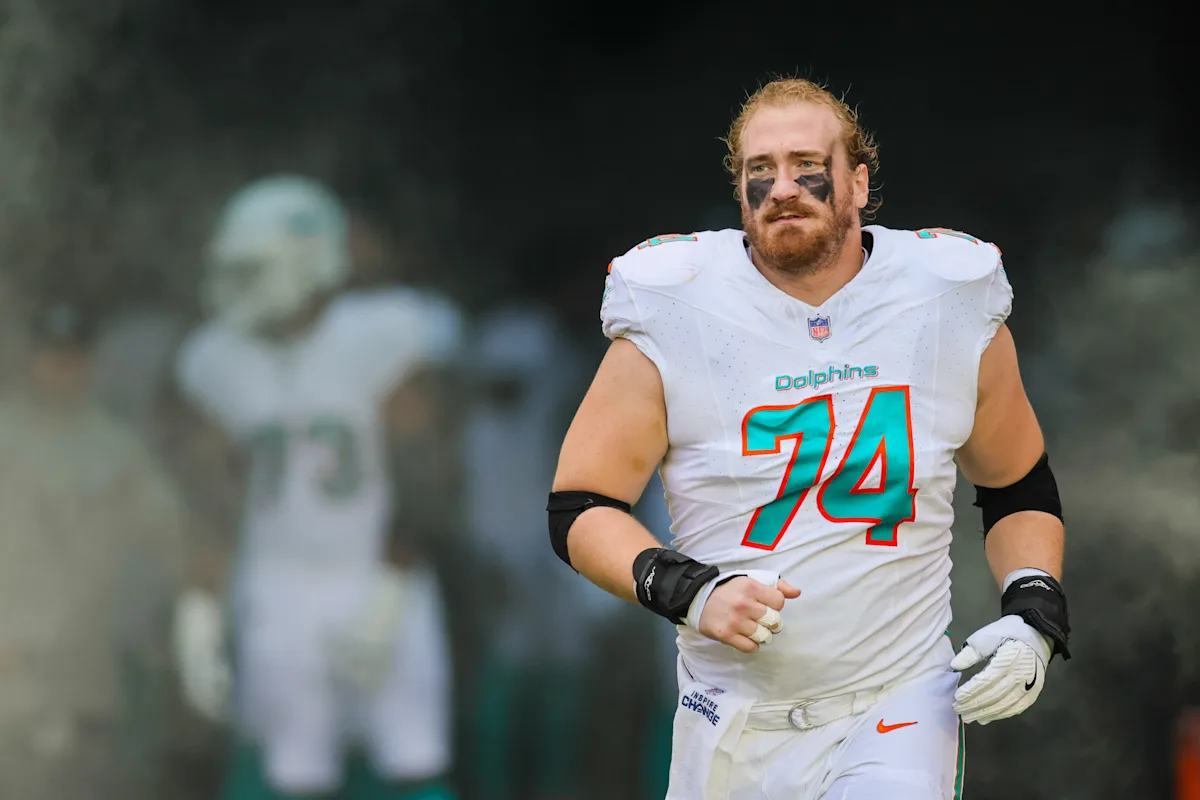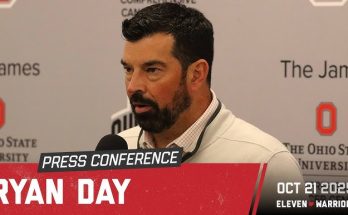The Miami Dolphins’ decision to re-sign Mike McDaniel is explained. Eichenberg, Liam
In the world of professional sports, team owners and management often make critical decisions that shape the future of a franchise. One of the most significant decisions in recent years for the Miami Dolphins was their choice to re-sign head coach Mike McDaniel. His contract extension not only highlights his success but also signals the team’s commitment to long-term stability and growth. This decision comes in the wake of McDaniel’s remarkable first two seasons as head coach, during which he reshaped the Dolphins’ offensive scheme, revitalized a once-struggling franchise, and brought a new sense of optimism to the organization and its fanbase.
A Fresh Start Under McDaniel’s Leadership
When Mike McDaniel was hired as the 14th head coach in Miami Dolphins history in 2022, many were curious to see what he could bring to the table. A long-time assistant coach with a focus on offense, McDaniel’s rise to head coach came after stints with the San Francisco 49ers, where he was instrumental in designing one of the NFL’s most dynamic and versatile offenses under head coach Kyle Shanahan. However, McDaniel was not a traditional head coaching candidate. He was known more for his innovative mind and ability to design offensive systems than for his experience as a traditional “leader of men.” Yet, the Dolphins saw potential in McDaniel, believing that his unique approach would elevate the team’s performance, especially after a tumultuous period under previous regimes.
Immediate Impact: Offensive Renaissance
McDaniel’s first season as head coach exceeded expectations. The Dolphins, under his leadership, turned their offense into one of the most high-powered units in the league. Miami finished the 2022 season with one of the NFL’s top offenses, ranking among the best in points per game and total yards. McDaniel’s offense was characterized by its creative schemes, diverse play calling, and the ability to maximize the talent of the players around him. The high-flying offense, led by quarterback Tua Tagovailoa, running back Raheem Mostert, and wide receivers Tyreek Hill and Jaylen Waddle, became a potent force in the league.
The offensive turnaround was especially notable considering that the Dolphins had struggled with offensive consistency for years prior to McDaniel’s arrival. McDaniel’s ability to integrate the talents of his key players into a cohesive, fast-paced system that took advantage of their strengths was evident in the team’s performance. Tua Tagovailoa had his best season as a pro under McDaniel’s tutelage, showcasing greater confidence, decision-making, and accuracy, particularly in deep ball throwing. Hill and Waddle formed one of the most dangerous wide receiver duos in the NFL, terrorizing opposing defenses with their speed and playmaking ability.
This offensive resurgence under McDaniel was precisely what the Dolphins needed to re-establish themselves as contenders in the AFC. McDaniel brought innovation, efficiency, and a fresh mindset that revitalized a franchise that had been stuck in mediocrity for several years.
Leadership Beyond X’s and O’s
While McDaniel’s impact on the offense was undeniable, his leadership qualities extended beyond the X’s and O’s of the game. McDaniel quickly built a strong rapport with his players, particularly with his quarterback, Tua Tagovailoa. One of the defining characteristics of McDaniel’s leadership style was his ability to connect with players on a personal level. His open communication, transparency, and willingness to listen made him a well-respected figure in the locker room.
McDaniel’s leadership style is unconventional compared to other NFL head coaches. Known for his calm demeanor, humility, and dry sense of humor, McDaniel created a culture of trust and collaboration. He was never one to raise his voice or belittle his players; instead, he empowered them to take ownership of their roles and grow as individuals. This approach helped foster a positive team culture, which contributed to the Dolphins’ success on the field.
In particular, McDaniel’s relationship with Tua Tagovailoa is noteworthy. From the very beginning, McDaniel believed in Tua’s abilities and worked tirelessly to build an offense around his strengths. This level of belief and support gave Tua the confidence to flourish, and their partnership became a defining feature of the Dolphins’ success under McDaniel. The trust McDaniel placed in his quarterback was reciprocated, creating a synergy that elevated the team’s performance.
Player Development: Key to Long-Term Success
One of the reasons the Dolphins decided to re-sign Mike McDaniel was his ability to develop talent, not just on the offensive side of the ball but across the entire roster. McDaniel’s coaching staff, including defensive coordinator Vic Fangio and special teams coach Danny Crossman, helped shape a balanced team that could compete at a high level on both sides of the ball.
While McDaniel’s primary focus was on the offense, his influence extended to the overall development of the team. Under his watch, the Dolphins made significant strides in areas such as player discipline, mental toughness, and overall football IQ. Young players such as wide receiver Jaylen Waddle, linebacker Jaelan Phillips, and cornerback Xavien Howard all saw improvements under McDaniel’s coaching, demonstrating his ability to get the most out of his players.
In particular, McDaniel’s approach to developing young quarterbacks, specifically Tua Tagovailoa, has been a hallmark of his early tenure. McDaniel’s patient, supportive style has helped Tua reach new heights in his career, especially in terms of confidence and comfort within the offensive system. This player development aspect, particularly with regard to the quarterback position, was a key factor in the Dolphins’ decision to extend McDaniel’s contract. The team’s faith in McDaniel’s ability to continue developing talent, both on the offensive and defensive sides of the ball, solidified their belief that he was the right coach to lead them into the future.
The Strategic Context: A Franchise on the Rise
The decision to re-sign Mike McDaniel also makes sense within the broader strategic context of the Miami Dolphins’ future aspirations. For several years, the Dolphins had been stuck in a cycle of mediocrity, unable to establish consistent success. After a decade of coaching changes, ownership instability, and underperforming rosters, McDaniel’s arrival signaled a new direction for the team. The Dolphins were no longer just another rebuilding franchise; they were a team on the rise, with the potential to contend in the AFC East and the league at large.
Re-signing McDaniel was not just about rewarding success; it was also about securing the team’s long-term vision. By locking up McDaniel for the foreseeable future, the Dolphins signaled to the league that they were committed to a stable and forward-thinking leadership structure. Stability is often key to success in the NFL, and by re-signing McDaniel, the Dolphins were signaling that they had confidence in his ability to guide the team into the next phase of their development.
Additionally, McDaniel’s offensive system and the talent on the roster align perfectly with the current landscape of the NFL. The league has become increasingly focused on dynamic offenses and playmakers, and McDaniel’s approach is perfectly suited to this new reality. The Dolphins’ commitment to McDaniel suggests they believe his offensive philosophies are the key to keeping them competitive in the long run, particularly in a division that includes formidable opponents like the Buffalo Bills and New England Patriots.
The Road Ahead: Challenges and Opportunities
While McDaniel’s first two seasons as head coach were promising, the road ahead is not without its challenges. The AFC East is one of the most competitive divisions in the NFL, and the Dolphins will need to continue evolving in order to compete with the Bills, who have dominated the division in recent years. Additionally, the defense will need to improve in order to become more balanced and provide better support for the offense.
McDaniel’s success has, however, put the Dolphins in a good position to address these challenges. His offensive system is already in place, and the team’s key players, particularly Tua Tagovailoa, are entering their primes. If McDaniel can continue to develop his players, adjust his game plans to counter future challenges, and maintain the team’s culture of trust and accountability, there is no reason why the Dolphins can’t compete at the highest level in the years to come.
A Commitment to the Future
The Miami Dolphins’ decision to re-sign Mike McDaniel is a testament to the success he has brought to the franchise in a short period. His innovative offense, leadership style, and ability to develop players have transformed the Dolphins into a team with serious potential. This decision is not just about rewarding past achievements; it is about securing the long-term future of the franchise under McDaniel’s guidance.
By locking up McDaniel for the foreseeable future, the Dolphins have shown that they are committed to building a sustainable, successful program. The team is poised for continued success, and with McDaniel at the helm, the Dolphins will remain a force to be reckoned with in the AFC for years to come.

